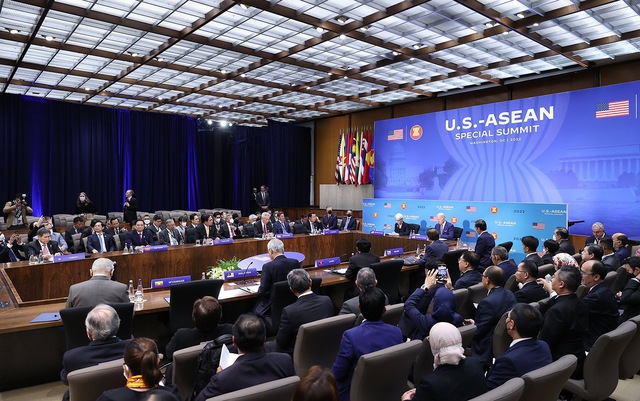Highlights from ASEAN – U.S. Special Summit
VGP – Deputy Foreign Minister Ha Kim Ngoc highlighted the significance of the ASEAN-U.S. Special Summit which took place in Washington D.C., the U.S. on May 12-13.

First of all, the summit is special as it was held to mark the 45th founding anniversary of the ASEAN-U.S. dialogue relations, indicating the resolve and strong commitment of the U.S., said Ha.
The event is also the clear evidence that both ASEAN and the U.S. attach importance to fostering their relationship.
The summit offers an opportunity for the leaders to figure out major orientations to elevate the ties and contribute to peace, stability and development in the region and the world.
Second, this is the first time, leaders of ASEAN and the U.S. had in-person meetings with leaders of the U.S. Congress, the U.S. Vice President and other Cabinet members, and businesses. This shows the American side's strong commitment and support for the advancement of the ASEAN-U.S. relations.
Regarding the major outcomes of the summit, Ha said the leaders issued a Joint Vision Statement in which they commit to establishing an ASEAN-U.S. comprehensive strategic partnership that is meaningful, substantive, and mutually beneficial, opening up a new era in the relationship between ASEAN and the U.S.
The two sides pledged to give priority to supply chains stabilization and cooperation in maritime security, health security, education, human resource development, science and technology, innovation, digital transformation, climate change, energy transition, green and sustainable development among others.
On the occasion, President Biden announced another US$150 million of initiatives to deepen the relations with ASEAN, which will help boost private investment in areas of mutual interests.
Third, both sides reiterated that they attach importance to each other's role and position. President Biden reaffirmed his Administration's commitment to support ASEAN centrality, expressed his wish to further lift up the relations with ASEAN to a new level and settle effectively emerging challenges in the region. For its side, ASEAN continues considering the U.S. as a top partner and expects the U.S. to continue positive engagement and contributions to cooperation in the region for shared peace security and prosperity in the region in line with international law.
Fourth, the leaders also exchanged views on regional and international issues. They agreed to exert efforts to ensure peace, stability, security, safety and freedom of navigation and over-flight in the region, including the East Sea, peacefully settle disputes in accordance with international law and the 1982 United Nations Convention on the Law of the Sea, and build up an environment conducive to negotiations for early conclusion of a practical and effective Code of Conduct in the East Sea that is in line with international law, including the 1982 United Nations Convention on the Law of the Sea./.
